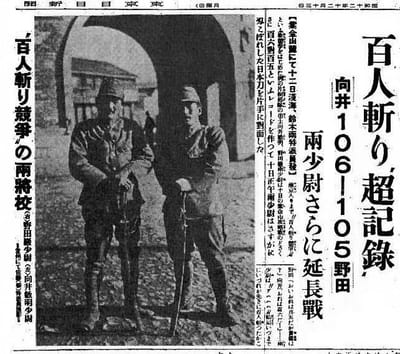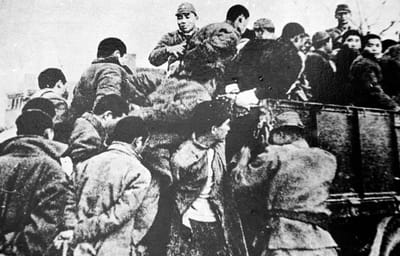The forgotten part of China in WWII: Nanjing massacre
Over 80 years and still no justice made
"There is no greater agony than bearing an untold story inside of you"(Maya Angelou)
History
Before the arrival of the Japanese troops, words had already spread that they are committing killing contest and pillaging their way through China. As a result, most of the citizens moved to the Nanking Safety Zone, which was set up by the Western businessmen and missionaries, in order to find refuge and hideout.However, the Japanese declined the formal request of setting up a safety zone in Nanjing. Nevertheless after invading Nanjing choose not to target the safety zone so as to avoid conflict with foreign countries like America, Britain and even Germany. But as time went the Japanese suspected that Chinese soldier have been disguising as refugees they started breaking in and taking anyone who resembled soldiers. The whole incident has lead to claims of Japanese to have killed at least 300000 deaths in Nanking as stated by Chinese and 200000 civilians and soldiers as stated by the Japanese (Fogel, 2002).
The Japanese started by eliminating the Chinese soldiers who surrendered. To the Japanese, submitting to your enemy is regarded as an of cowardice and humiliation considering that they were drilled with concepts like military honour from childhood. Thus they looked at the Chinese Prisoner Of War (POW) with utter disrespect and even worthless and subhuman. Besides, if any men survived, they were later buried alive, mutilated, burned to death, killed by cold(Iced) and animals (Chang,2015).
Later, after finishing their task of killing all the surrendered POW, they turned their focus on the women and infants of Nanking. Women ageing from 8-70 were sexually abused and infants were slaughtered with their intestines and body parts being cut off. Around 20000-80000 Chinese women were raped (Chang, 2015). Even pregnant women were not spared as their fetuses were ripped for mere amusement, raped and killed to death.
Nanjing massacre has been a controversial event as many parts of the incidents still is debated on and there are many underlying aspects, including politics, for the event to have taken place hence it made me quite interested due to the fact Sino-Japanese relations still remains tensed after the end of the massacre and world war II.
Also, the fact that Nanjing had a safety zone for their citizens but later the Japanese carried out killing sprees and competition including raping the women and execution of infants and elderly regardless of their background and status. This brings question on the motive, goals and reason the Japanese executed such inhumane acts as well as the necessity of carrying out rape on the women and killing spree to gain full control over Nanjing instead of some other less brutal medium.
In this project, I want to explore the degree of violence the Japanese used on Nanjing(uncensored by Japanese) which made the superpower relationship strained to this day. Also, the fact that part of the city was first declared a safety zone but was later targeted by the Japanese brings about the question on the reason which made them choose to carry out the acts. Lastly, I want to explore the necessity of genocide in order to understand with what intention did the Japanese carried out the such acts on the Chinese citizens.
Reason for choosing this instance
Press the play button to watch how the Japanese censored the media
The reason to choose this instance was because of the conflicting views and numbers given by both the Chinese and Japanese on the incident as well as the tense Sino-Japanese relationship over the years . Besides, the majority of local Japanese believe that the incident was a was not as serious as blamed by the Chinese and even claimed that the Chinese staged the whole incident due to the fact the media and news delivered to Japanese was censored to a high degree. This lead the topic to be controversial whenever debated considering the fact that the general public from both sides received different information regarding the situation. The reason for the tension over the genocide can be attributable to the fact that both countries hold a extremely high level of nationalism and for Japanese due to the fact that everything was censored at the wartime by the Japanese, including news and communication, as well as a question on pride and honour of the nation which they really have high regard for.
The Advocates
George Ashmore Fitch
American Protestant missionary in China, the Young Men's Christian Association, Nanking Safety Zone International Committee Administrative Director.
Learn MoreThe Survivors
Why did the Japanese commit genocide?
The bold headline reads, "'Incredible Record' - Mukai 106 – 105 Noda—Both 2nd Lieutenants Go Into Extra Innings" (Oliver, 2019)
Below are some statements given by Japanese soldier on why they carried out the execution and acts in Nanjing.

Japan Today
The Japanese public usually deny the fact that genocide was committed by its soldier in Nanjing. To a large extent, this is mainly due to the fact that the news and information that was provided to them during the massacre was false, censored or even staged as written in the letters of the victims in the massacre. The citizens blindly believed their ruler at that time and seeing that they respected their emperor and country exceedingly, they did not want to accept the occurrence of such horrible acts even if they might have gotten some hint of it. This hence leads to considering their denial to taken as a defence mechanism as their refusal to acknowledge an the unacceptable truth of the massacre or even admitting it into consciousness can be regarded as a way to ruin the image of their country and their wrongdoings.
China Today
Tension between both countries
From the Japanese point of view, the Chinese tend to exaggerate thing hence leading to them thinking that the whole incident was a hoax and never occurred. Also, with Japanese have access to limited and wrong sources on the incident, the majority of the public do not have any idea of the genocide and even deny the fact so as to support their nation as they are taught from a young age that their nation is right and nation come before all. Hence, their action can be regarded as ignorance as they do not possess knowledge on the massacre or even taught about it differently.
For the Chinese, it is not wrong deem Japanese wrong and merciless at all as they have been through so much during the genocide. Also to be hurt by the Japanese action is no surprise as well as the have never been given a formal apology, which they still demand to this day. Although getting an apology will not heal their wound, their acceptance of the wrongdoing and genocide will give them a some healing.

Reference Page
"George Ashmore Fitch." Wikipedia. November 21, 2018. Accessed May 08, 2019. https://en.wikipedia.org/wiki/George_Ashmore_Fitch.
"John H.D. Rabe." John H.D. Rabe | Yale University Library. January 27, 2016. Accessed May 08, 2019. https://web.library.yale.edu/divinity/nanking/rabe.
"Robert O. Wilson." Robert O. Wilson | Yale University Library. Accessed May 08, 2019. https://web.library.yale.edu/divinity/nanking/wilson.
Chang, Iris. The Rape of Nanking: The Forgotten Holocaust of World War II. New York: Basic Books, a Member of the Perseus Books Group, 2015.
CGTN. "The Last Survivors: Living Testimony of Nanjing Massacre." YouTube. December 13, 2017. Accessed May 08, 2019. https://www.youtube.com/watch?v=oojlrHbrmSg.
Fogel, Joshua A. The Nanjing Massacre in History and Historiography. Berkeley: University of California Press, 2002.
Guttentag, Bill, and Dan Sturman. "Nanking." July 03, 2007. Accessed May 08, 2019. https://www.youtube.com/watch?v=jfkk-GtM_sI.
Honda, Katsuichi, Frank Gibney, and Karen Sandness. The Nanjing Massacre: A Japanese Journalist Confronts Japan’s National Shame. London: Routledge Taylor & Francis Group, 2015.
Hu, Hua-ling. "Minnie Vautrin." National Women's History Museum. 2016. Accessed May 08, 2019. https://www.womenshistory.org/education-resources/biographies/minnie-vautrin.
Lu, Suping. They Were in Nanjing: The Nanjing Massacre Witnessed by American and British Nationals. Hong Kong: Hong Kong Univ. Press, 2004.
Oliver, Mark. "27 Nanking Massacre Photos That Reveal One Of History's Very Worst Atrocities." All That's Interesting. February 28, 2019. Accessed May 08, 2019. https://allthatsinteresting.com/rape-of-nanking-massacre#4.
Shi, Young, James Yin, and Ron Dorfman. The Rape of Nanking: An Undeniable History in Photographs. Chicago, U.S.A: Innovative Publishing Group, 1997.
Smalley, Martha Lund. American Missionary Eyewitnesses to the Nanking Massacre: 1937-1938. New Haven, CT: Yale Divinity School Library, 1997.
香港電台, RTHK. "Nanjing Massacre 70th Anniversary." YouTube. February 18, 2008. Accessed May 08, 2019. https://www.youtube.com/watch?v=Y_qR34M6Q_0.
